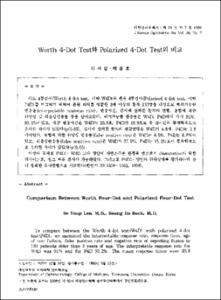Worth 4-Dot Test와 Polarized 4-Dot Test의 비교
- Keimyung Author(s)
- Lee, Se Youp
- Department
- Dept. of Ophthalmology (안과학)
- Journal Title
- 대한안과학회지
- Issued Date
- 1998
- Volume
- 39
- Issue
- 7
- Abstract
- To compare between the Worth 4-dot test (W4D) with polarized 4-dot test (P4D), we examined the interpretable response rate, response time, age of test failure, false positive rate and negative rate of reporting fusion in 133 patients older than 3 years of age. The interpretable response rate for W4D was 91% and for P4D 93.2%. The mean response times were 20.9seconds for W4D versus 16.9 seconds for the P4D, the difference being statistically significant (p<0.05). The age of test failure for W4D was 4.8 years old and for P4D 3.8 years old. The false positive rate of reporting fusion for W4D was 4.5% and for P4D 8.8%. The false negative rate for W4D was 37.5%, while for P4D was 15. 2%, the difference being statistically significant (p〈0.05). In conclusion, the P4D was found to be less dissociative test by allowing more natural environment, and was easier, more rapid interpretable test. Therefore, the P4D may provide a more accurate assessment of a patient's sensory status.
워트 4둥검사(Worth 4-dot test, 이하 W4D)와 편광 4둥검사(Polarized 4-dot test, 이하 P4D)를 비교하기 위하여 본원 외래를 방문한 3세 이상의 환자 133명을 대상으로 해석가능한 반응율(interpretable response rate), 반응시간, 검사에 실패한 환자의 연령, 융합에 대한 위양성 및 위음성반응율 둥을 알아보았다. 해석가능한 반응율은 W4D, P4D에서 각각 91%, 93.2%이었고, 평균 반응시간은 W4D가 20.9초, P4D가 16.9초로 두 검사간의 통계학적으로 유의한 차이가 있었다(p<0.05). 검사에 실패한 환자의 평균연령은 W4D가 4.8세,P4D는 3.8 세이었다. 융합에 대한 위양성 반옹율(false positive rate)은 W4D는 4.5%, P4D는 8.8%이 었고,위음성반응율(false negative rate)은 W4D가 37.5%, P4D는 15.2%로서 통계학적으 로 유의한 차이가 있었다(p<0.05).
이상의 결과로 P4D는 W4D 보다 양안에 자연스러운 환경을 줌으로서 dissociation이 덜한 검사이므로, 쉽고 빠른 검사가 가능하였다. 그러므로 P4D는 양안의 감각상태를 평가하는데 좀 더 정확한 검사방법으로 사료된다.
- Alternative Title
- Comparison Between Worth Four-Dot and Polarized Four-Dot Test
- Keimyung Author(s)(Kor)
- 이세엽
- Publisher
- School of Medicine
- Citation
- 이세엽 and 백승호. (1998). Worth 4-Dot Test와 Polarized 4-Dot Test의 비교. 대한안과학회지, 39(7), 258–262.
- Type
- Article
- ISSN
- 0378-6471
- Appears in Collections:
- 1. School of Medicine (의과대학) > Dept. of Ophthalmology (안과학)
- 파일 목록
-
-
Download
 oak-bbb-02573.pdf
기타 데이터 / 325.89 kB / Adobe PDF
oak-bbb-02573.pdf
기타 데이터 / 325.89 kB / Adobe PDF
-
Items in Repository are protected by copyright, with all rights reserved, unless otherwise indicated.